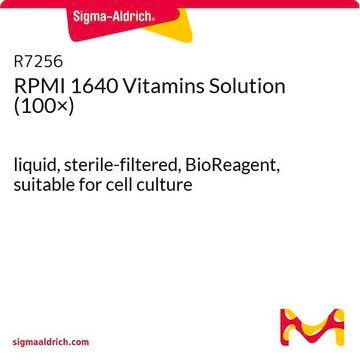おすすめの製品
品質水準
無菌性
sterile-filtered
形状
liquid
テクニック
cell culture | mammalian: suitable
不純物
endotoxin, tested
構成
L-glutamine: no
輸送温度
ambient
保管温度
2-8°C
詳細
MegaCell™ is a line of versatile media, formulated to significantly reduce the amount of serum required for cultivating mammalian cells in vitro. It is effective as a basal formulation for the growth and maintenance of adherent or suspension cell lines. When supplemented with 3% fetal bovine serum (FBS), MegaCell supports proliferative rates and maximal cell densities comparable, and in some cases superior, to the conventional basal formulation supplemented with 10% fetal bovine serum.
アプリケーション
MegaCell™ RPMI-1640 Medium has been used:
- as a component of the TSC medium for culturing trophoblast stem cells (TSC)
- as a component of 25 ng/ml FGF4 and 1 g/ml heparin (TSF4H medium) for culturing TSCs
- as a component of embryo-like structures (ETS) embryo medium and TS cell medium for culturing embryonic stem cells (ESCs) and TSCs
再構成
4 mMのL-グルタミン(G7513、200 mM溶液 20 mL)を添加してください。
法的情報
シグマ アルドリッチはプロメガ社との契約に従って、MegaCell商標を使用しています。
MegaCell is a trademark of Promega Corp.
よく一緒に購入される製品
製品番号
詳細
価格
保管分類コード
10 - Combustible liquids
WGK
WGK 3
引火点(°F)
Not applicable
引火点(℃)
Not applicable
適用法令
試験研究用途を考慮した関連法令を主に挙げております。化学物質以外については、一部の情報のみ提供しています。 製品を安全かつ合法的に使用することは、使用者の義務です。最新情報により修正される場合があります。WEBの反映には時間を要することがあるため、適宜SDSをご参照ください。
Jan Code
M3817-BULK:
M3817-VAR:
M3817-PH:
M3817-500ML:
M3817PROC:
試験成績書(COA)
製品のロット番号・バッチ番号を入力して、試験成績書(COA) を検索できます。ロット番号・バッチ番号は、製品ラベルに「Lot」または「Batch」に続いて記載されています。
この製品を見ている人はこちらもチェック
Sarah Ellys Harrison et al.
Nature protocols, 13(7), 1586-1602 (2018-07-11)
Mammalian embryogenesis requires the coordination of embryonic and extra-embryonic tissues to enable implantation into the uterus and post-implantation development to establish the body plan. Mouse embryonic stem cells (ESCs) are a useful tool for studying pluripotent embryonic tissue in vitro.
Nina S Corsini et al.
Cell stem cell, 22(4), 543-558 (2018-04-07)
Stem cell-specific transcriptional networks are well known to control pluripotency, but constitutive cellular processes such as mRNA splicing and protein synthesis can add complex layers of regulation with poorly understood effects on cell-fate decisions. Here, we show that the RNA
Berna Sozen et al.
Developmental cell, 51(6), 698-712 (2019-12-18)
Mammalian blastocysts comprise three distinct cell lineages essential for development beyond implantation: the pluripotent epiblast, which generates the future embryo, and surrounding it the extra-embryonic primitive endoderm and the trophectoderm tissues. Embryonic stem cells can reintegrate into embryogenesis but contribute
Jinhong Meng et al.
PloS one, 6(3), e17454-e17454 (2011-03-17)
Stem cell transplantation is a promising potential therapy for muscular dystrophies, but for this purpose, the cells need to be systemically-deliverable, give rise to many muscle fibres and functionally reconstitute the satellite cell niche in the majority of the patient's
ライフサイエンス、有機合成、材料科学、クロマトグラフィー、分析など、あらゆる分野の研究に経験のあるメンバーがおります。.
製品に関するお問い合わせはこちら(テクニカルサービス)






